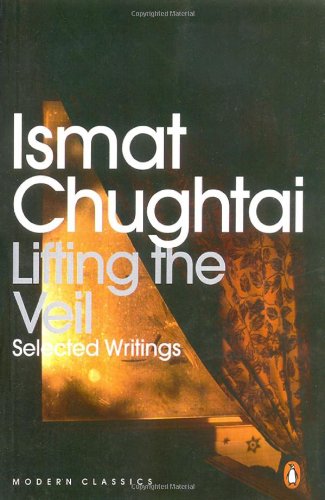Lifting the Veil -Selected Writings by Ismat Chughtai
Ismat Chughtai is a very renowned name in Urdu literature. Since the last few years I have come across reviews and recommendations of her works, especially her short stories revolving around female characters from different spheres of life and societal status. I am grateful for the different translated versions available, that I am able to read her works. Translated literature is just so important to delve into the essence of a culture, the ethos of its people and learn more about the world that it encapsulates. This particular collection is selected and translated by M.Asaduddin. As the 14-pages introduction to the collection goes, Ismat Chughtai is ‘Urdu’s most courageous and controversial writer’. Her pieces expressed female desires like no other during her times, they thwarted patriarchy, took real life socio-political observations and made a commentary out of it through stories and fictional characters, which showed the society a mirror. Doesn’t that intrigue you enough to read her works?
Chughtai once commented - “There’s something in me that militates against putting faith in anyone uncritically, however great an intellectual he may be. Such a bad habit -- I would first look for loopholes in his theory. One should first examine all points of disagreement before coming to a consensus. I cannot believe in anything suddenly, take it at its face value. I think, the first word articulated by me after birth was -- ‘why’. ” -- I see a bit of myself in these lines.
Fiction speaks volumes. Stories reach the masses. The common man. Be it through just oral tales. I would like to vouch upon the relevance of fiction and its effect on society time and again. You can argue on facts, scream out your heart on the unfairness of it all, and people may be moved by it now, but they will move on soon. But you write a story, it is there for posterity, it will be rediscovered some time and it will hit the right spot. When I read ‘Lihaff’ - ‘The Quilt’ - the most controversial piece, that found a mention in almost all articles about the author, the one that led to a court case against her, was for me a humorous tale bordering on homosexuality told from a kid’s perspective. All the hue and cry was for this! ‘Gainda’ told a story of unsuccessful love, and life’s prospects cut short by an untimely pregnancy. ‘The Wedding Suit’ told of spinsterhood and how that is looked down upon in society. ‘Kafir’ talks of the absurd hatred between Hindu and Muslim kids, often fueled by their family members. And so on ..
It is so strange and exciting that a piece of literature can open doors to another, and that to yet another, and the cycle of discovery and exploration goes on. I have come across names of writers of her time - Sadat Hasan Manto, who had a perpetual healthy disagreement with Chughtai’s point of views and was her life-long friend, who fiercely advocated her fierce individualism. Their solidarity as writers is a tale in itself. I want to read his works.
Translation of important works is such a tough and important job. It makes literature of a particular land accessible to the majority. It helps broaden perspectives, diminish prejudices. Language is rather nuanced. Capturing the essence of it in a translated version is not an easy task. I can understand urdu when spoken, well, almost. So the colloquial terms used in this book, those cannot be done without added to my reading experience - I could hear the characters bickering, nagging, lamenting, and rejoicing in their own tongue. Language itself has always intrigued me - it is so layered. A particular word in a particular language may mean so deep that the direct translation in another may not express the feelings in the same way at all. And there is no substitute for idioms. I wish to translate Odia short stories someday - I think the volume of translated Odia texts is rather minimal.









Comments
Post a Comment